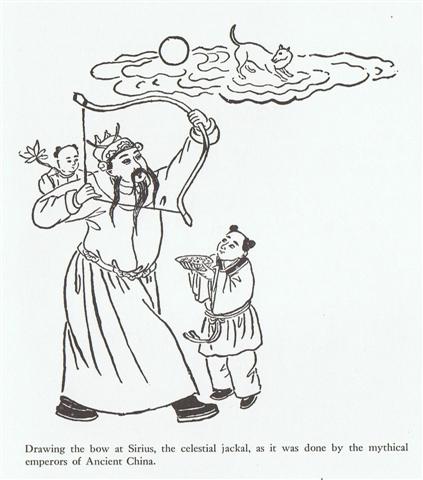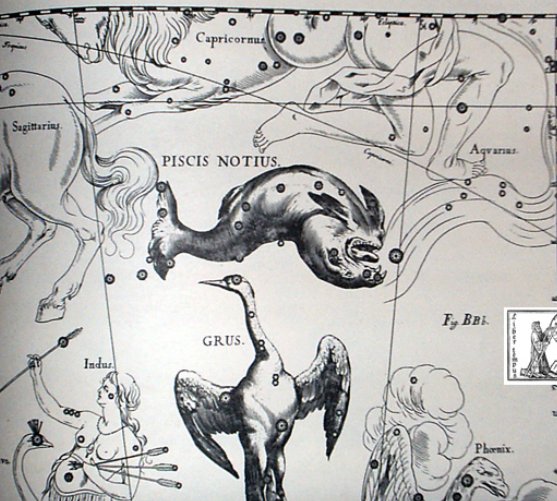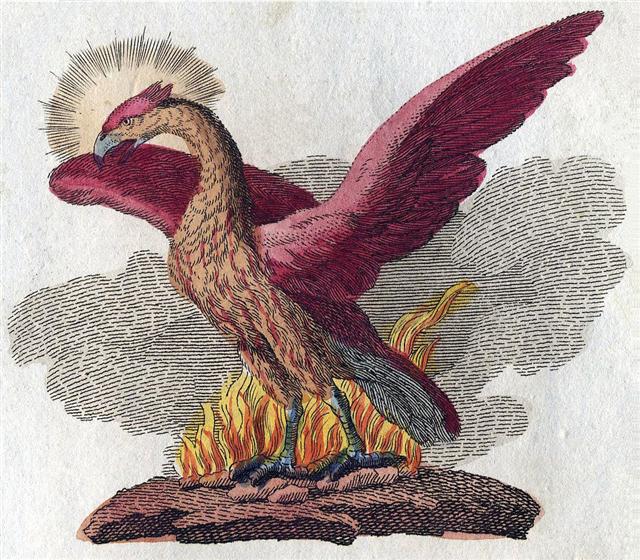From Maunga Teatea the dream soul saw Rangi Meamea in the distance. ... The dream soul of Hau Maka looked around. From Maunga Teatea she looked to Rangi Meamea (i.e., Ovahe). The dream soul spoke the following: 'There it is - ho! - the place - ho! - for the king - ho! - to live (there in the future), for this is (indeed) Rangi Meamea' ... From the account of the Explorers it is possible to understand that Rangi Meamea corresponded to "July 23 (Te Anakena 23): ... They remained in Hanga Hoonu for five days. On the twenty-third day of the month of July ('Anakena'), they reached Rangi Meamea ...
For the season of needfire had ended in the preceding day, in the 5th and last day of Hanga Hoonu. The name Rangi Meamea suggests a Reddish Sky - as when the celestial fire had returned up above. Ragi. Ra'i, T. 1. Sky. 2. Palace. 3. Prince. Henry. 1. Sky, heaven, firmament; ragi moana, blue sky. 2. Cloud; ragipuga, cumulus; ragitea, white, light clouds; ragi poporo, nimbus; ragi hoe ka'i cirrus (literally: like sharp knives); ragi viri, overcast sky; ragi kerekere, nimbus stratus; ragi kirikiri miro, clouds of various colours. 3. To call, to shout, to exclaim. Vanaga. 1. Sky, heaven, firmament, paradise; no te ragi, celestial. 2. Appeal, cry, hail, formula, to invite, to send for, to notify, to felicitate, precept, to prescribe, to receive, to summon; ragi no to impose; ragi tarotaro, to menace, to threaten; tagata ragi, visitor; ragikai, feast, festival; ragitea, haughty, dominating. 3. Commander. 4. To love, to be affectionate, to spare, sympathy, kind treatment; ragi kore, pitiless; ragi nui, faithful. Churchill. Modoc, a language used on the northwest coast of North America: 'A single word, lagi, was used both for the chief and for a rich man who possessed several wives, horses, armour made of leather or wooden slats, well-filled quivers and precious firs. In addition to owning these material assets, the chief had to win military victories, possess exceptional spiritual powers and display a gift for oratory.' (The Naked Man) Mea. 1. Tonsil, gill (of fish). 2. Red (probably because it is the colour of gills); light red, rose; also meamea. 3. To grow or to exist in abundance in a place or around a place: ku-mea-á te maîka, bananas grow in abundance (in this place); ku-mea-á te ka, there is plenty of fish (in a stretch of the coast or the sea); ku-mea-á te tai, the tide is low and the sea completely calm (good for fishing); mau mea, abundance. Vanaga. 1. Red; ata mea, the dawn. Meamea, red, ruddy, rubricund, scarlet, vermilion, yellow; ariga meamea, florid; kahu meamea purple; moni meamea, gold; hanuanua meamea, rainbow; pua ei meamea, to make yellow. Hakameamea, to redden, to make yellow. PS Ta.: mea, red. Sa.: memea, yellowish brown, sere. To.: memea, drab. Fu.: mea, blond, yellowish, red, chestnut. 2. A thing, an object, elements (mee); e mea, circumstance; mea ke, differently, excepted, save, but; ra mea, to belong; mea rakerake, assault; ko mea, such a one; a mea nei, this; a mea ka, during; a mea, then; no te mea, because, since, seeing that; na te mea, since; a mea era, that; ko mea tera, however, but. Hakamea, to prepare, to make ready. P Pau., Mgv., Mq., Ta.: mea, a thing. 3. In order that, for. Mgv.: mea, because, on account of, seeing that, since. Mq.: mea, for. 4. An individual; tagata mea, tagata mee, an individual. Mgv.: mea, an individual, such a one. Mq., Ta.: mea, such a one. 5. Necessary, urgent; e mea ka, must needs be, necessary; e mea, urgent. 6. Manners, customs. 7. Mgv.: ako-mea, a red fish. 8. Ta.: mea, to do. Mq.: mea, id. Sa.: mea, id. Mao.: mea, id. Churchill. In contrast Maunga Teatea was not red but white (not redhot as a young fire but white and cool as his dry old shin-bones). Mauga. Maúga. 1. Last; aga maúga o te Ariki o Hotu Matu'a, King Hotu Matua's last work. 2. Hill, mountain. Mouga, moúga. Last; vânaga moúga o te Ariki O Hotu Matu'a, the last words of King Hotu Matu'a. Vanaga. Mauga kore, impalpable. Mouga. 1. Enough, that's all, at last. 2. Mountain, ridge of hills; mouga iti, hillock; tua mouga, mountain top; hiriga mouga; hillside, declivity, slope. P Pau.: mahuga, mountain. Mgv.: mou, maga, mountain. Mq.: mouna, mouka, peak or crest of a mountain. Ta.: maua, moua, mountain. 3. Extinction, end, interruption, solution; te mouga o te hiriga, end of a voyage; pagaha mouga kore, without consolation. 4. To get. Churchill. Tea. 1. Light, fair, whitish. 2. To rise (of the moon, the stars); ku-tea-á te hetu'u ahiahi, the evening star has risen. Vanaga. 1. To shine, be bright, brilliant, white; tea niho, enamel of the teeth; ata tea, dawn; teatea, white, blond, pale, colorless, invalid; rauoho teatea, red hair; hakateatea, to blanch, to bleach. P Pau.: faatea, to clear, to brighten. Mgv.: tea, white, blanched, pale. Mq.: tea, white, clear, pure, limpid. Ta.: tea, white, brilliant. 2. Proud, vain, haughty, arrogance, to boast; tae tea, humble; teatea, arrogant, bragging, pompous, ostentatious, to boast, to show off, haughty; hakateatea, to show off. Mgv.: akateatea, pride, vanity, ostentatious, to be puffed up. Ta.: teoteo, boastful, proud, haughty. 3. Mgv.: teatea, heavy rain. Ha.: kea, the rain at Hana and Koolau. Churchill. 1. White, clear; fair-complexioned person, often favorites at court; shiny, white mother-of-pearl shell, cfr. keakea, kekea, Mauna Kea. Po'o kea, towhead, gray-haired person. One kea, white sand (this is shortened to ōkea or kea, as in the expression kea pili mai, drift gravel - vagabond). (PPN tea). 2. Breast milk. See Nu'a-kea. 3. A variety of sugar cane, among Hawaiians one of the best-known and most-used canes, especially in medicine: clumps erect, dense, of medium height; pith white. Ua ola ā 'ō kō kea, living until kea cane tassels (until the hair turns gray). 4. Name listed by Hillebrand for kolomona (Mezoneuron kavaiense); see uhiuhi. Wehewehe. KEA. adj. Haw., also keo, keo-keo, white, lucid, clear; a-kea, openly, public; au-akea, at noon, midday. Sam.: tea-tea-vale, be pale; ao-atea, forenoon; atea-tea, wide, spacious. Tah.: tea, white; teo-teo, pride, haughtiness; atea, clear, distinct, far off. Marqu., tea, atea, white, broad daylight, also name of the principal god; light generally, as opposed to darkness. Fiji., cea-cea, pale, deathlike; cecea, daybreak, light of morning. Malg., tziok, brilliant, snowwhite. Ceram (Mahai), teen, a star. Greek, θεος, m. θεα, f. god, goddess, divinity generally. In Greek, θεος signified no god in particular, but was applied to almost all the gods, though perhaps more often to the sun. As the first gods were the sun, moon, &c., their brilliancy and whiteness were the underlying sense of the names given them. That primary sense was apparently lost in the Greek and the other West Aryan branches, though in the Polynesian both the primary and derivative sense has been preserved, as in the Marqu. atea, both god and light, in the Tah. tapu-tea, the rainbow, and the Sam. tapu-i-tea, the evening star ... (Fornander)
|
||||||||||||||||||||||||||||||||||||||||||||||||||||||||||||||||||||||||||||||||||||






